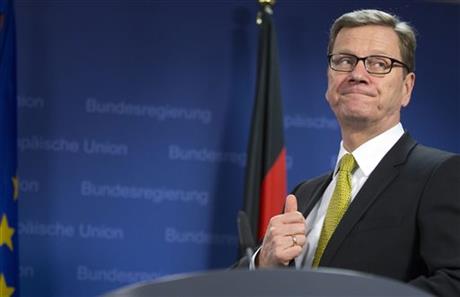
By RAF CASERT
German Foreign Minister Guido Westerwelle takes his place at the podium during a media conference after a meeting of EU foreign ministers in Brussels on Monday, Nov. 18, 2013. EU foreign ministers met in Brussels Monday to discuss, among other issues, Syria’s poison gas stockpile. The Organization for the Prohibition of Chemical Weapons has adopted a plan to destroy Damascus’s estimated 1,300-ton arsenal, which includes mustard gas and sarin, outside Syria, but has yet to find a country willing to host the risky operation. (AP Photo/Virginia Mayo)
Mideast Syria
File – This file image provided by Shaam News Network on Thursday, Aug. 22, 2013, which has been authenticated based on its contents and other AP reporting, purports to show dead bodies after an attack on Ghouta, Syria on Wednesday, Aug. 21, 2013. The tiny and impoverished Balkan nation of Albania was emerging Friday, Nov. 15, 2013 as a likely location for the destruction of Syria’s chemical weapons stockpile. The Organization for the Prohibition of Chemical Weapons was discussing a plan to destroy its estimated 1,000-metric-ton arsenal, which includes mustard gas and the deadly nerve agent sarin. Syria says it wants the weapons destroyed outside the country and the OPCW has described that as the “most viable” option.(AP Photo/Shaam News Network, File)
Mideast Syria
FILE – This Aug. 21, 2013, citizen journalism image provided by the Media Office Of Douma City which has been authenticated based on its contents and other AP reporting, shows a Syrian man mourning over a dead body after an alleged poisonous gas attack fired by regime forces, according to activists, in Douma town, Damascus, Syria. The tiny and impoverished Balkan nation of Albania was emerging Friday, Nov. 15, 2013 as a likely location for the destruction of Syria’s chemical weapons stockpile. The Organization for the Prohibition of Chemical Weapons was discussing a plan to destroy its estimated 1,000-metric-ton arsenal, which includes mustard gas and the deadly nerve agent sarin. Syria says it wants the weapons destroyed outside the country and the OPCW has described that as the “most viable” option.(AP Photo/Media Office Of Douma City, File)
Albania Syria
Thousands of Albanians in Tirana, Friday Nov. 15, 2013, greet the announcement by Prime Minister Edi Rama saying he turned down a request by the United States to be part of an operation to destroy Syria’s chemical weapons stockpile, under the supervision of international experts. Albania, a NATO member, was seen as a possible choice since it recently destroyed its own poison gas arsenal. (AP Photo/Hektor Pusina)
Prev
1 of 4
Next
BRUSSELS (AP) — Not a single European Union nation came forward on Monday offering to host the destruction of Syria’s poison gas stockpile, with many instead calling for the arsenal to be eradicated close to Syria itself.
Belgium had been considered a strong candidate after the withdrawal of Albania, but Defense Minister Pieter De Crem said that “the movement of those weapons is a tough enough task in itself” and crossed his country out as a possible destination.
“To do that here at home — I don’t see that at first sight, and also not in the long term,” he told VRT network, highlighting a reluctance found across the 28 EU nations.
“There is no member state that has come forward in saying ‘OK, give us the stuff’,” said Dutch Foreign Minister Frans Timmermans.
After Albania refused to take on the task Friday, Belgium — as well as France — had been considered a possible candidate, if only because it has a long history of destroying the gas arsenal from World War I.
The Organization for the Prohibition of Chemical Weapons has adopted a plan to destroy Damascus’s estimated 1,300-ton arsenal, which includes mustard gas and sarin, outside Syria, but has yet to find a country willing to host the risky operation.
German Foreign Minister Guido Westerwelle also took his country out of the mix. “When I look at the technicality, the geographical stretch, then I think that such a discussion makes no sense,” he said.
The OPCW has not released any names of countries where the weapons could be destroyed, but says it remains confident it can wipe out the entire arsenal by mid-2014. Norway has said it will send a civilian cargo ship and navy frigate to pick up the stockpile.
Timmermans said that it might make sense to turn the whole issue around. “Instead of taking the chemical weapons out of Syria to the installations where they would be destroyed, one could perhaps take the installations to the chemical weapons instead,” he said.
Wherever it happens, the destruction of Syria’s weapons will be overseen by experts from the OPCW, which won the Nobel Peace Prize this year for its efforts to eradicate poison gas around the world.
Poison gas was first used in Belgium during World War I and many thousands of canisters still lie buried in the farm fields straddling western Belgium and northern France. Belgium still has operational forces specialized in neutralizing the gas.
Several EU nations, including Germany and the Netherlands, called for more financial support to take care of the destruction.
Total contributions to the trust fund for the destruction stand at 10.4 million euros ($14 million).


